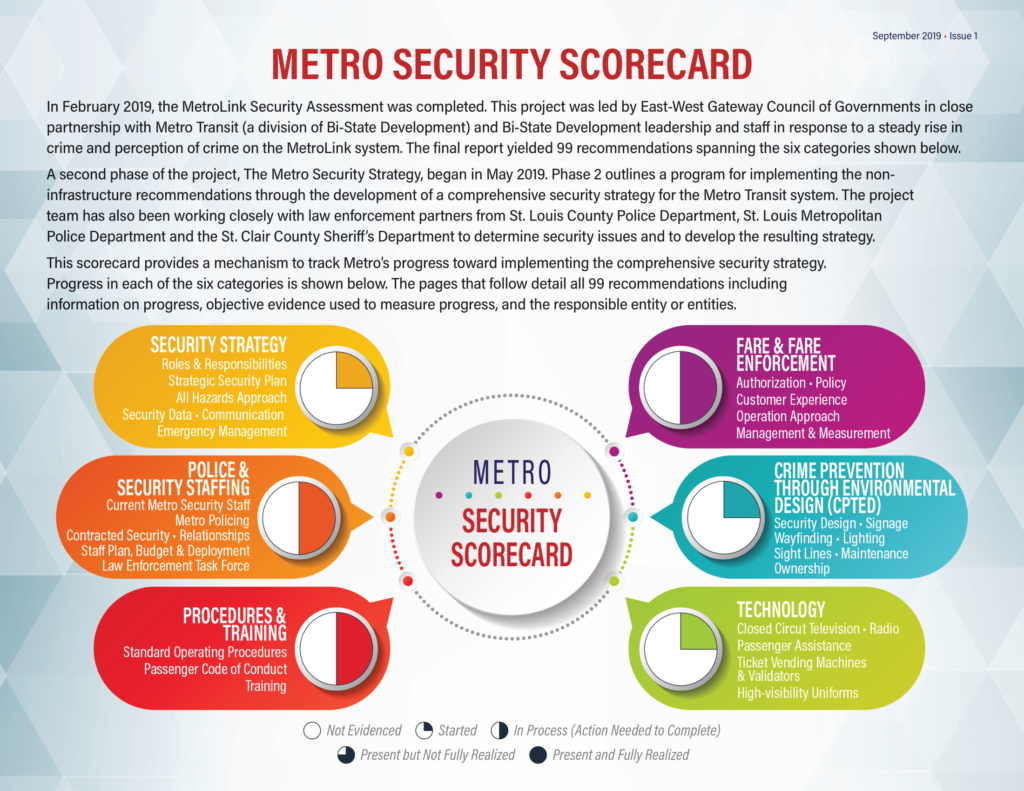The St. Louis regional effort to improve safety and security on the Metro Transit system in eastern Missouri and southwestern Illinois continues to make significant progress, according to the latest quarterly independent scorecard. WSP, in partnership with East-West Gateway Council of Governments (EWGCOG), prepares the quarterly assessments of Metro Transit’s progress. The EWGCOG website also includes an overview of the Comprehensive Metro Security Strategy. Since the initial scorecard was released in September 2019, the majority of the 99 recommendations have been partially, if not fully addressed.
The Q2 2021 update was the first one that WSP and EWGCOG have been able to do in-person since November 2019 with Metro Public Safety staff, as travel and in-person meetings were restricted due to the COVID-19 pandemic. During that 19-month period, the assessment team was unable to document firsthand all areas of progress, and the current quarterly scorecard shows a few instances where items previously reported as complete had not been completed to the satisfaction of the assessment team. Each of these items is being addressed, and WSP and EWGCOG have expressed confidence the impacted scores will improve in the next quarter.
“We have discussed each of the specific areas where the scores were adjusted downward with Metro’s Security Leadership Team, who hold weekly meetings to monitor the progress of the 99 recommendations. We are confident these items will be addressed by the time we develop the next update in September,” said Marcie Meystrik, Corridor and Long-Range Planning Coordinator, East-West Gateway Council of Governments.
The items yet to be fully addressed are predominantly found in the Fare & Fare Enforcement, Crime Prevention Through Environmental Design or CPTED, and Technology categories, and many of those are already in progress. Not all recommended items are under Metro’s authority and not all of those that are Metro’s responsibility are specifically security-related, such as enhancements still needed to the transit fare program.
The need for a shared radio channel for the MetroLink Police Task Force remains one of the most significant items on the list to be completed, but in presenting the latest scorecard, representatives from WSP assured the EWGCOG Board of Directors that conversations on that topic are ongoing among Metro and its three key police department partners. Metro has signed contracts with the St. Louis Metropolitan Police Department, St. Louis County Police Department and the St. Clair County (IL) Sheriff’s Department.
The latest security assessment indicates under the Police Security and Staffing category, all recommendations have been addressed. The quarterly independent assessments specifically track progress in implementing the 99 recommendations outlined in the strategy agreed to by bi-state area leadership, police partners, Metro, and the Bi-State Development Board of Commissioners. All of the recommended actions fall within six categories: Security Strategy, Police & Security Staffing, Procedures & Training, Fare & Fare Enforcement, CPTED, and Technology. Each area is detailed in the quarterly scorecards, which includes information on progress, objective evidence used to measure progress, and the responsible entity or entities for the progress.
To learn more about Metro Transit’s efforts related to safety and security, visit metrostlouis.org/safety-and-security. Current and previous quarterly scorecards are posted on the EWGCOG’s website: http://www.ewgateway.org/metro-security/.
